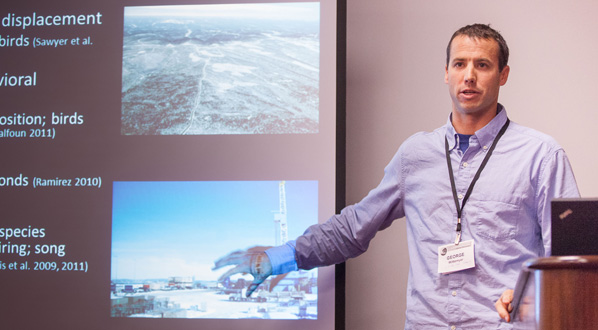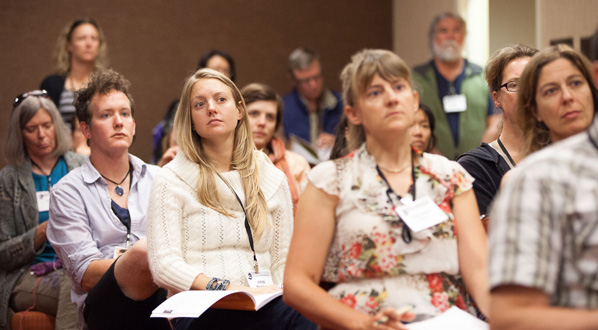ICCB 2013 Symposia - Wednesday & Thursday
Scientists from around the world will present the latest in conservation research and practice at nearly 50 symposia at ICCB.
- Below is the ICCB symposia schedule for Wednesday and Thursday 24 & 25 July. To view symposia scheduled for Monday and Tuesday click here.
Note: ICCB starts on Sunday evening 21 July with the opening ceremony, but the main scientific program begins Monday.
In addition to symposia, the ICCB scientific program also features hundreds of contributed talks and poster and speed-poster presentations.
Click here to download an Excel file sorted by day of the complete schedule of contributed talks, posters and presentations (does not include symposia).
Wednesday 24 July: 08:00-10:00
- Advancing science-informed ocean management decisions through ecosystem health report cards
- A National Network for Wildlife Conservation: challenges and solutions
- Defining recovery and recovery criteria for endangered species: Science and policy issues behind the current debate in the US and Canada
- Developing Solutions for Conflicting Land and Natural Resource Use in Africa
- Compassionate Conservation - Animal Welfare in Conservation Practice
- Buffer zones and land use change around protected areas: connecting socio-economic and ecological systems
- SCB Approach to Carbon Neutrality: Assessing organizational performance and sponsoring biodiversity conservation projects
- Scientists as stakeholders: perceptions of citizen science research for conservation by peers, reviewers, and policy makers
Thursday 25 July: 08:00-10:00
- Climate change and conservation of marine species: bridging the gap between ecology, climate science and policy [Part I]
- Valuing the Environment for Decision-Makers and Stakeholders: The New Big Picture, From Maryland's Genuine Progress Indicator to Botswana's Accounts
- The Role of Urban Green Spaces in Maintaining Biodiversity and Ecosystem Services
- Ecosystem-Based Management in Practice
- Integrated tools and processes for assessing conservation opportunity
- Culture and Conservation: conserving sacred sites and species in the Anthropocene
- Public Voices Count: Participatory techniques for socio-ecological systems maintenance
Thursday 25 July: 10:30-12:30
Thursday 25 July: 16:00-18:00
ICCB Symposia - Wednesday 24 July
SCB Approach to Carbon Neutrality: Assessing organizational performance and sponsoring biodiversity conservation projects
24 July
Organizer: Abrams, R., Dru Associates, Inc.
The Society for Conservation Biology has been working to offset its carbon footprint from administration and global and regional meetings since 2007, by self-assessing and sponsoring field projects combining science, government and local communities. The Ecological Footprint Committee (EFC), in cooperation with Local Organizing Committees and the Executive Office, are working to set an example to other organizations by reducing our carbon footprint. The ecological costs of operating an organization must be understood to successfully offset atmospheric degradation. This Symposium demonstrates activities in carbon footprint management that involve stakeholders to address the accumulation of carbon dioxide in earth's atmosphere. SCB as a 'carbon customer' is learning how to adapt to our changing biosphere. There is no better way for SCB members to respond to climate change than to actually participate in mitigating our contribution to climate change. The EFC annually assesses SCB's carbon footprint, including office operations, travel, conferences and the production of the journal Conservation Biology. Major decisions have been made by the Society with the benefit of this information, such as the change from annual to biannual ICCB's to reduce our travel footprint. SCB also collects funds from participants in ICCB and Regional SCB meetings, to develop and sponsor conservation projects that are estimated to have a carbon benefit sufficient to offset SCB emissions.
Developing Solutions for Conflicting Land and Natural Resource Use in Africa
24 July
Organizer: Bailey, N., Africa Biodiversity Collaborative Group
In many parts of sub-Saharan Africa, various actors lay claim to land for multiple, overlapping purposes. The same area may hold oil or minerals that could provide income to the government and jobs for people, rare species of wildlife that require uninterrupted habitat for their survival, or may be valued as sacred forests by local communities. Competing claims to limited land and natural resources present numerous challenges to stakeholders including conservationists, local communities, governments and the private sector, and require innovative, interdisciplinary approaches to find solutions. Collaboration between international conservation NGOs, governments, development partners and others is a beneficial approach as it brings together different strategies, points of view and resources to address emerging and high priority threats to biodiversity and development in Africa. Competing demand for land and natural resources is a common theme of many of our ongoing efforts. Successful approaches require multidisciplinary strategies that tie together systems (ecosystems, agricultural systems), disciplines (conservation planning, extractive industries, land tenure, development) and stakeholders (local people, governments, conservationists). This session will explore the many conservation approaches to land use planning and the impacts on communities and conservation of the scramble for resources in Africa.
Scientists as Stakeholders: Perceptions of Citizen Science Research for Conservation by Peers, Reviewers, and Policy Makers
24 July
Organizer: Shirk, J., Cornell Lab of Ornithology
Citizen science and other forms of public participation in scientific research (PPSR) connect systems, disciplines, and stakeholders for conservation. It is these very connections, however, that can raise challenges for professional scientists considering PPSR as an approach to conservation research. Scientists are critical partners in designing and carrying out PPSR initiatives, intentional collaborations with the public that aim to generate new science-based knowledge for research or policy. Such approaches have increased in acceptance within the scientific sphere for their ability to access otherwise unavailable information and their ability to affect public science learning. Even so, PPSR researchers can still face tough professional questions - through review of journal articles or grant applications, in decisions regarding tenure and promotion, or in negotiating conservation policies - regarding the usability of data collected by non-scientists, the investment of time in non-research activities such as education, and in some cases their (actual or perceived) engagement in advocacy. We confront head-on a long overdue conversation: how is citizen science research perceived by peers? And how can we, as a scientific community, fully understand and fairly critique the merits of citizen science for conservation research and research-based policy?
Defining recovery and recovery criteria for endangered species: Science and policy issues behind the current debate in the US and Canada
24 July
Organizer: Carroll, C.,
The US Endangered Species Act and Canada's Species at Risk Act (SARA) are among the world's most important biodiversity-related statutes. The Canadian federal government has suggested that SARA needs to be streamlined, in part by substituting ecosystem conservation for time-consuming recovery plans developed for individual species. In the US, recent reviews have proposed that, given the number of taxa which may require species-specific conservation measures in perpetuity, policymakers need to shift emphasis from long-term federal management of listed species to more rapid delisting that allows management by state and private entities. In contrast, others see such calls for more streamlined planning and management as undermining conservation of vulnerable taxa. In essence, this debate hinges on unresolved questions concerning how the public interprets the meaning of recovery and what cost it is willing to bear to achieve it. For some, recovery may imply self-sustaining populations that can play their historic role in ecosystems, whereas others see recovery of a small intensively-managed population as sufficient. This symposium addresses the theme of ICCB2013 as it brings together a multi-disciplinary group of biologists and policy experts from the US and Canada to address policy questions surrounding the definition of recovery, as well as the related issue of how planners can efficiently and transparently develop recovery criteria that guide recovery efforts.
Advancing science-informed ocean management decisions through ecosystem health report cards
24 July
Organizer: McField, M., Healthy Reefs Initiative
Ocean resource management often means making hard decisions. And, as conservation actions increasingly include ecosystem-level protection goals, these decisions are getting harder. Ecosystem health report cards can be used to present the best-available scientific information in a way that informs decision-making. Ecosystem health report cards bridge social and ecological systems and provide a multidisciplinary platform for stakeholders to build a common vision of ecosystem health and social well-being. They can also serve as a multi-institutional or even multinational platform for promoting management recommendations based directly on scientific monitoring. Existing tools have been developed using various approaches from expert judgment to standardized scoring criteria and highlight varying degrees of success towards effective and durable conservation outcomes. This session will draw together practitioners to explore the processes by which ecosystem health report cards are produced and scientific information is provided to managers to catalyze and inform management. Drawing on lessons learned from previous experiences, participants will identify the process steps, external drivers and communications tools and policy mechanisms that have contributed credibility and legitimacy to report cards, focusing on the factors that lead to success in informing management and favoring effective conservation decisions.
Compassionate Conservation - Animal Welfare in Conservation Practice
24 July
Organizer: Draper, C., Born Free Foundation
Animal welfare is of increasing concern to scientists, policymakers and the public alike. Anthropogenic environmental change, and interventions in the name of conservation, may have lethal and sublethal effects on individual animals, and consequently compromise animal welfare. While individual behaviour and ecology effects on population-, species- and ecosystem-level changes have been widely studied, animal welfare considerations in conservation practice have been relatively neglected until recently. Consideration of the welfare of individual animals may inform both the ethics and practice of implementing conservation management and delivery, while animal welfare considerations may have significant effects on conservation outcomes. From captive breeding and reintroduction, invasive species control, and endangered species population viability, to the techniques employed in the name of conservation research: there is broad scope for conflict and synergy between animal welfare and conservation. Animal welfare may be perceived by conservationists as a hindrance or "luxury", or alternatively an increasingly rigorous science with practical implications for conservation. The consideration of animal welfare in conservation raises questions as to how far the responsibility for animal welfare extends into "the wild". This symposium will provide an overview of key areas of interaction between animal welfare and conservation, using specific examples of conflicts and possible resolutions.
A National Network for Wildlife Conservation: challenges and solutions
24 July
Organizer: Griffith, B., U.S.G.S., Alaska Coop. Fish & Wildlife Research Unit
There is a clear need for a national conservation support-program that promotes large scale biodiversity conservation through information sharing and capacity-building services (BioScience 62(11):970-976). This network could build on the substantial expertise of state conservation programs that are guided by State Wildlife Action Plans and increase the effectiveness and efficiency of conservation at the national scale. Implementing such a network will present a multitude of challenges that include identifying one or more host organizational structures and funding support, ensuring sustained participation of network members, and incorporating lessons learned from existing regional collaborations in a timely way. We seek to preserve the momentum generated by the referenced BioScience paper by assembling a group of potential network members and experts in large-scale collaborative efforts to elaborate on the opportunities and challenges of implementing a national network for wildlife conservation. Our symposium will connect ecosystems, technical and human dimensions of wildlife conservation, and stakeholders from states, non-governmental organizations, and federal agencies in a collaborative effort to advance the formation and implementation of a national network for wildlife conservation.
Buffer zones and land use change around protected areas: connecting socio-economic and ecological systems
24 July
Organizer: Kaplin, B., Antioch University New England
Growing concern about species loss and land use/land cover change in and around many protected areas (PAs) has led to questions about their effectiveness. The matrix surrounding PAs can have a profound impact on conservation effectiveness. Buffer zones, implemented properly, may minimize stressors arising inside and outside PAs, presenting an opportunity to integrate social and ecological systems - local communities, government and private institutions, conservation scientists, economics and ecology, agriculture and biodiversity - into PA planning. Buffer zones can encourage integration of PAs with the wider ecological and socio-economic land- or seascape, contributing to system resilience. Nonetheless, little research has been directed at exploring and evaluating integrative approaches to buffer zones and protected areas. The aim of this symposium is to provide a multidisciplinary view of current buffer zone-protected area thinking. We connect disciplines, stakeholders and systems by including multiple stakeholder views, exploring a range of roles buffer zones can play in management, mediation of human-wildlife and people-park relationships, poverty alleviation, to maintenance of ecological function within PAs. We will explore innovative conservation tools and policies such as payment for ecosystem services and ecotourism. The symposium integrates scientific theory and practice fundamental to effective planning and management of buffer zones in varied ecosystems.
ICCB Symposia - Thursday, 25 July
Thursday Symposia Text.txt
Climate change and conservation of marine species: bridging the gap between ecology, climate science and policy
25 July
Organizer: Nye, J., Stonybrook University, School for Marine and Atmospheric Sciences







